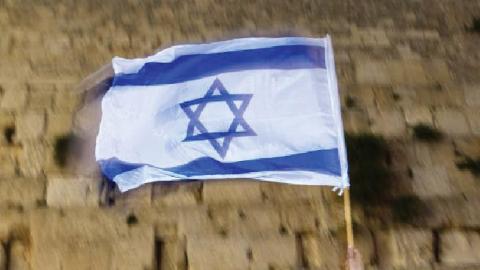There are negative reasons to be a Zionist, and there are affirmative reasons.
The negative ones, which relate to historical anti-Jewish hatred and abuse, make the humanitarian case for Zionism — that the Jews need a state because they need a refuge. That argument launched the Zionist movement in the 19th century, and it remains valid to this day.
The affirmative reasons relate to Jewish civilization. They boil down to the conviction that Jewish culture is an invaluable inheritance that only in the Land of Israel, in a state with a Jewish majority, can be developed fully and perpetuated reliably.
My father was a Holocaust survivor. His family lived in the Austrian part of Poland. The Nazis killed his parents and seven of his eight siblings. If Israel had existed at the time, my grandparents and aunts and uncles would have had a place to escape to. Naturally, as a child, the humanitarian reasons to be a Zionist predominated with me.
My father was not much for books, but one that impressed him since he was a boy was Auto-Emancipation, a Zionist manifesto written in 1882 by a Russian Jew named Leo Pinsker. At my dad’s urging, I read it when I was young. I remember being struck by Pinsker’s observation that no people bleeds for foreigners and so the stateless Jew seeking hospitality is like a beggar and a refugee. “And what beggar is welcome?” Pinsker asks, and “Where is the refugee to whom a refuge may not be refused?”
As an adult, I came to appreciate the positive reasons to be a Zionist. Israel is not just a refuge and bastion. For the Jews as a people, it is the “organic center.”
I use that term because George Eliot used it in her novel Daniel Deronda, published in 1876. A Jewish character in the novel named Mordecai calls on his people to found “a new Jewish polity,” which would recreate their “organic centre,” revitalizing their civilization. Mordecai declares, “Let there be another great migration, another choosing of Israel to be a nationality.”
Mordecai argues: “Who says that the history and literature of our race are dead? Are they not as living as the history and literature of Greece and Rome, which have inspired revolutions? . . . These were an inheritance dug from the tomb. Ours is an inheritance that has never ceased to quiver in millions of human frames.”
These words often come to my mind. George Eliot, a non-Jew whose real name was Mary Ann Evans, penned them 20 years before Theodor Herzl wrote The Jewish State. Her proto-Zionism does not lie in a tomb. It remains alive. I feel, as it were, that it quivers within me. I don’t think anyone in the last century and a half has crystalized with greater force or elegance the affirmative reasons to be a Zionist.
***
To be a Zionist is to revel in the ways Israel has integrated Jewish principles and traditions into the daily life of a large modern democratic society. Though liberal and secular, Israel is a Jewish state. What does that mean?
It means that the Jews are in the majority. Their collective interests prevail, so they enjoy the dignity of self-reliance and self-defense. Hebrew is the main language. Jewish history inspires the geographical names. Jewish subjects have a special place in the schools. The Jewish religious calendar influences the rhythm of life. Every Friday afternoon, even in nonreligious neighborhoods, one can hear the hush of Sabbath descend. Britain, Sweden, and other democracies have crosses on their flags, while Israel has a Star of David. And the interests of Jewry as such are a primary concern of the national government.
None of this is so in any other country in the world.
On the way in which democracy and ethnicity relate to each other, a brief comment:
America’s Founders did not create our republic for the purpose of protecting a particular people’s existence and culture. In general, though Christmas is a national holiday, the American political tradition is averse to official privileges for particular ethnicities or faiths.
So, it’s understandable that an American may question how Israel can be both democratic and Jewish.
The short answer is that the way Americans practice democracy is not the only way. It helps to consider that most liberal, democratic countries were founded on an ethnic basis. Most give special consideration to the majority population’s cultural interests. Many favor a particular language. Some have a state church. A number, including Ireland and Japan, have laws of return that favor expatriates of the majority people. As democracies go, Israel, being ethnically based, is ordinary. It is the United States that is exceptional.
The compatibility of Zionism and democracy relates to the issue of dual loyalty, which poses the question of whether those American Jews who are Zionists should be viewed as having divided loyalties. The question has been of personal interest to me, of course, because of my government work. Some of my more rabid critics have accused me of divided loyalties.
First of all, the frame of mind that produces such accusations is the same that argued for opposing John Kennedy’s presidential campaign on the grounds that, as a Roman Catholic, Kennedy would subordinate his oath of office to his loyalty to the pope. It’s simplistic and erroneous — and it violates the American democratic principles that it claims to uphold.
This matter was addressed nicely by Louis Brandeis.
“Let no American imagine that Zionism is inconsistent with patriotism,” Brandies said in a speech in 1915, soon before he joined the Supreme Court. “Multiple loyalties are objectionable only if they are inconsistent. A man is a better citizen of the United States for being also a loyal citizen of his state, and of his city; for being loyal to his family, and to his profession or trade. . . . Every Irish American who contributed towards advancing home rule was a better man and a better American for the sacrifice he made. Every American Jew who aids in advancing the Jewish settlement in Palestine, though he feels that neither he nor his descendants will ever live there, will likewise be a better man and a better American for doing so.”
I say “Amen” to Justice Brandeis. Americans, Jewish or not, can easily square their support for Zionism with their sacred duties, in and out of the government, as American citizens.
My final comment is that there’s something miraculous about the Jews’ attachment to the Land of Israel. Benjamin Disraeli captured the magic in his 1847 novel Tancred. “The vineyards of Israel have ceased to exist, but the eternal law enjoins the children of Israel still to celebrate the vintage,” he wrote, referring to the Jewish Feast of Tabernacles. “A race that persist in celebrating their vintage, although they have no fruits to gather, will regain their vineyards. What sublime inexorability in the law! But what indomitable spirit in the people!”
So that’s why I’m a Zionist.
Read in National Review















